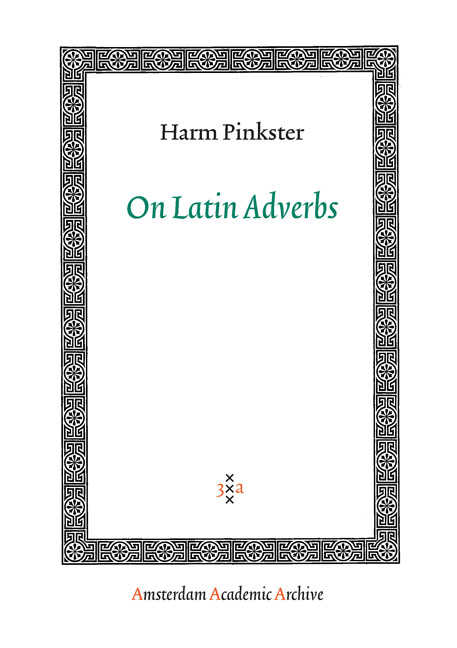Book contents
- Frontmatter
- Preface to this Edition
- Preface
- Contents
- Introduction
- 1 General Problems of Studying a Dead Language
- 2 Problems of Classification
- 3 Adverbs in Roman Grammatical Theory
- 4 The Adverb in Latin Linguistics
- 5 Adverbs as Derived Forms
- 6 Syntactic Problems
- 7 Subclassification of Adverbs
- 8 Adverbs and other Invariables
- 9 The Relationship Between Adverbs and Prepositions
- 10 Adverbs and Connectors
- 11 Adverbs and Subordinators
- Bibliography
- Indices
- Index Auctorum
- Titles Published in the Aaa Series
3 - Adverbs in Roman Grammatical Theory
Published online by Cambridge University Press: 24 January 2021
- Frontmatter
- Preface to this Edition
- Preface
- Contents
- Introduction
- 1 General Problems of Studying a Dead Language
- 2 Problems of Classification
- 3 Adverbs in Roman Grammatical Theory
- 4 The Adverb in Latin Linguistics
- 5 Adverbs as Derived Forms
- 6 Syntactic Problems
- 7 Subclassification of Adverbs
- 8 Adverbs and other Invariables
- 9 The Relationship Between Adverbs and Prepositions
- 10 Adverbs and Connectors
- 11 Adverbs and Subordinators
- Bibliography
- Indices
- Index Auctorum
- Titles Published in the Aaa Series
Summary
This chapter will be devoted to what Roman grammarians have said about the adverb. It is not my intention to present an exhaustive discussion of the different opinions held by each grammarian, of their sources or mutual relations. Those who are interested may consult Jeep (1893: 268-82). I will give only what seems to be relevant to the modern view on adverbs and confine myself almost entirely to Priscian's Institutiones grammaticae and to Charisius’ Ars grammatical..
The definition of the adverb given in most modem handbooks is based to a large extent on what Priscian, Charisius and others have said about it. In their turn, they were heavily indebted to their Greek predecessors. In fact, the very term ‘adverbium’ is a translation of Greek epirrhema. For the chapter of Priscian, which I take here as a base, one may readily find almost verbatim parallels in e.g. Apollonius Dyscolus. However, I will neglect these.
Priscian and others endeavour to distinguish between the ‘parts of speech’ by giving the semantic aspects of each class (Priscian 2,4,17: ‘proprietates significationum’), following Apollonius (Robins 1951: 64-5; 1967a: 57), but, in fact, most definitions are mixed (Schopf 1963: 64). They contain information about syntax, semantics and morphology, and we find stray remarks about accent as well. I will now first discuss the definitions and dispersed general observations under these headings, next discuss a few specific subclasses and individual adverbs and, finally, add a remark about the primary importance of word-classes in Roman grammar.
General properties ofadverbs
Syntax
The adverb is placed with a verb (Prisc. 2,4,20), ‘more suitably’ (aptius) before it, just as adjectives are placed before substantives (15,6,39; 16,3,16). Adverbs may be postponed, Priscian observes, with the exception of all monosyllables such as non ('not’), ne ('that not’), dum ('while’), temporal cum ('when’), affirmative per ('very’), and vel, when meaning valde ('very’). There are several subclasses, too, that are usually placed before the verb: adverbia demonstrativa like en, ecce ('look’), interrogativa like cur, quare, quamobrem ('why’), adverbia’ hortativa like heia, age ('come on’), adverbia similitudinis like quasi, ceu, veluti ('like', ‘as it were’), adverbia vocandi like heus ('hey! ’), adverbia optandi like 0, utinam ('would that’).
- Type
- Chapter
- Information
- On Latin Adverbs , pp. 35 - 44Publisher: Amsterdam University PressPrint publication year: 2005



